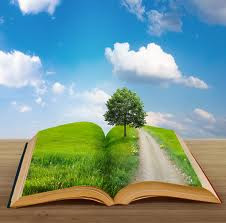Rosalie Fitzpatrick on fiction and cooking without allergens: writing, editing, best of lists, reading recommendations, books, mangas, movies, TV shows, comics, quotes and recipes. All recipes focus on allergen free cooking suitable for endometriosis and pregnancy: wheat, egg, cow's milk, rye, oats, soy, almonds, peanuts, red meat and gluten free. Also, most are seafood, alcohol, yeast and nut free. All other allergen exclusions vary per recipe.
Pages
▼
Wednesday, October 31, 2012
On judging good books and terrible books and the writing of either
There are good books, great books, entertaining books, life changing books, enlightening books, exciting books, world exploring books, whispering books, shocking books, horrifying books, repellent books and much more. All of them a good books. They're books to be read and to learn from. And then there are terrible books in which there is nothing but emptiness behind the words.
The question is: How can you tell them apart? Followed, of course, by these questions: What is worth printing or reading? How do we choose what to print and read? Are there many left unprinted that are worth reading? Are we able to find all the books worth our time or are there some rotting away in attics or lost to mass publication, distribution and mulching?
There is much to be said on the questions that follow and usually along the lines of: we aren't printing everything that's worthwhile, we're printing and reading a lot of trash, there are there so few people calling the shots on what becomes available to read, there are tonnes of books left unprinted that are interesting to read... so on and so forth. Essays could and have been written on many of these topics, addressing the pros and cons of publishing, of writing and or reading.
But the question for today is: How can you tell a terrible book full of emptiness from a good book, whatever its particular genre or style or 'flavour', as it were? It is a good question to answer given that I'm currently in the book recommendation business, if not reviewing. It is also one to ponder while reading manuscripts and assessing them for an agent. And even when writing a book of my own. Certainly, just because I put pen to paper or fingers to keyboard it doesn't mean that my work isn't full of emptiness. And how do I explain that a light-hearted piece isn't light for emptiness? The question does echo through so much. It is there when I buy books, when I choose what to read next. It is there when I scan mangas, when I look at movie covers on a lonely evening. It is there when faced with a library's worth of books and I stand about wondering where to start or if I shouldn't at all because there's something better elsewhere. It is there when faced with the choices educators hand my way and I wonder why I'm reading this old thing over again and not something else. It is even there when I grasp onto a book so I can walk down the street without thinking I've forgotten my mind or when I put the current selection close on the bedside table so I can sleep well at night. The question bears thought, I believe, as I have often been called upon to justify my thoughts, actions, choices, habits, attachments, writing style, imaginary worlds, genre choices, intellectual pursuits and judgments.
To me the answer is both fairly simple and deeply complicated, as all good things tend to be. The short and sweet answer reads like a greeting card: A good book makes you think and dwell within the covers as long as possible. Something of this sort. Or maybe an answer along the lines of ripples in the mind, echoes of thought and feeling, lingering attachments to what was found within the covers or even a life-changing work.
But the vague greeting card answers don't help much if you want to actually create a work that could be said to be a darn good book. Just how do you make people dwell on what's within the covers or feel any sort of mind-altering impact? Just how literary and serious must a writer be to create such pieces of great worth? Or better yet, is there a formula you can show me on how to do all of the above? What the above leaves the creative is a mass of confusion, nail-biting paranoia and uncertainty. It leaves the creative wondering if their work is justifiable or even worthy enough to be read at all? Maybe if all the spelling and grammar is correct then it could be read by at least someone, right?
Greeting card evaluations are useless. You can't provide a manuscript assessment with any of them. You can't answer why you chose one book over another with them. You can't justify your attachments either. No, you must produce more in-depth analysis and justify yourself clearly. Otherwise, one book is as good as another because every book reflects at least a little of the light that is life and if we're reading for those reflections then they are everywhere and in every book written by a human. And even by those written by non-humans, if ever we come across such a thing (I'd love to see such a day but that's just my mind off wandering again).
The longer and more complicated answer to the question of what is the difference between a terrible book and a good one is something you'll trip over nearly every time you ask the question "Why?" just after asking the question "What's your favourite book?". To each his or her own, really, as it depends on what is reflected, whether the reader sees it or not, whether it is a perfect or distorted reflection of their life experiences and whether the reflection is at all recognisable or understandable. This means that there's no perfect or best book ever written, just ones the majority find intriguing, comforting, illuminating, disturbing and life-altering and ones the majority just don't get.
"William Shakespeare!", you're thinking, because he addressed so much of what it is to be human. But then, so do many others in their dramas. "Chaucer!" for his ability to address our baser natures and reveal us for what we are. But then, there are thousands of lesser know writers about who constantly point out just how gritty, polluted and base humanity is - take Chuck Palahniuk for an example of a better known one. Chuck or Chaucer? Which works are better? Don't think on mass popularity or intellectual pursuits. Don't consider how many sold or lasting through centuries. Just the works. Side by side. Which are the best sets of work? There are likely many of you saying "Well Chaucer, obviously" while the others are muttering "But I've only read Chuck's and his works are more relevant to today". Between these two major players you are stuck in a deadlock. But if I tried to pitch my own work or a fellow unpublished writer's work into the mix against either or both (mine isn't a gritty-mode book but this is just for argument's sake so whatever) and asked the same question I believe the answer would be flat our Chaucer or Chuck, depending on which I or we are being judged against. Yet this answer could well be wrong.
All this is on how we value a book, how we perceive it due to culture and fashion. But perceived value and fashion doesn't actually make a book good. If it did we'd be lauding Twilight and 50 Shades of Grey rather than trashing them so thoroughly (after reading them or sometimes only after hearing of the content). Which means that such perception and fashionability, based on individual and mass opinion, do not a good book make and so all of those books that are printed and read on mass could well be trash. When working with equations you have to mind the faults. Or at least that's what I learnt while steadily failing math exams during year 9 for not paying attention to such a boring subject (my own perception but certainly not that of Hawking who I happen to admire, like so many others). Making up answers and saying they're definitely true for everyone just doesn't cut it.
And on that note, to add further complications to this mess of an explanation, there are many out there who love Twilight and 50 Shades of Grey and will hate you for trashing it in front of them, also finding themselves almost forced to justify themselves at which point they become indignant, angry, rebellious, argumentative and possibly violent. The need to justify stems from the feeling that the masses, or at least the person in front of them, has trashed everything about themselves that they saw reflected back at them in those books. Along with trashing their right to an opinion, their right to be heard and their hope to be understood.
Is publication an indication that the book is good and a lack of publication that the book is terrible? The answer to that is a resounding no. You may be thinking, "but I can't remember reading such a terrible book" but I will assume that is because most of the time you've chosen books to read as you've seen that there could be something in there for you. The experience is quite different when you're reading without that choice, just reading what's been plunked in front of you. At least you might remember experiencing something like this at school. Even then though, the books given to you were likely ones capable of reflecting a lot of life to a lot of people and so they were likely good ones, whether you paid them any attention or not.
What a mess...
So. I'd have to say that in short you're likely to write a good book as long as you put some of yourself in it. And you're likely to find a book good as long as you put in the effort to see something in it.
If you blinker yourself too much you won't see anything and all books will be terribly empty. Why? Because you are. If you remove the blinkers, or never set them in place (unlikely), then you are free to experience anything and see the reflections everywhere. And you become full enough to possibly, one day, be called wise.
If you fail to writing your thoughts, experiences, emotions, actions and sensations down then no-one can see any of it within your book. Being literary isn't required. Being serious isn't required. Slugging people over the head with a long fictional argument on a particular subject and ending it with a moral or definitive answer isn't required. Being human and conveying your humanity is. Fill the pages with it however you like, in whatever style you like and using characters born of yourself. Readers will see you and see themselves and your work will be good.
The equation here isn't so faulty. A terrible book is one written by a blinkered and empty person. There's no substance, no life, within or behind the words. No meaning behind the actions of characters. No resounding cause and effect within the world written. This lack is easily felt, whether a book has been published and approved of or not, and it is because of this that the book quickly fades away.



No comments:
Post a Comment